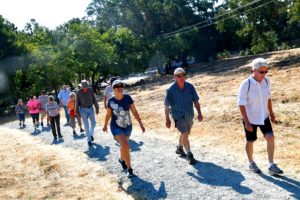Ask Mr. Pedometer and Friends….
January 30, 2019
Q: Mr. Pedometer, you tell us we need to Move More each day. What if we only have time to get out and be active and walk on the weekends? Is one day of activity better for your wellness than not being active at all?
A: According to this article by Andrew Weil, M.D., from the Wellness Website, a recent study was published that has changed the way experts view so-called “weekend warriors.”
“Health and fitness experts have long described ‘weekend warriors’ in a mildly negative way. They used the term for individuals who exercised irregularly, perhaps in weekend pickup games. They warned of muscle strains, or much worse — something akin to the heart attacks suffered by those who occasionally shovel snow. Weekend warrior meant, more or less, ‘knucklehead.’
“But no more. A large new study in JAMA Internal Medicine has revealed large mortality benefits for all manner of weekend warriors.
Those who worked out once or twice a week had a 30 percent  lower mortality rate (during the study period, from 1994 to 2012) than those who didn’t exercise at all. Despite their infrequent workouts, these individuals exceeded the 150 minutes a week of moderate to vigorous exercise advocated by U.S. and world health organizations. In that regard, their good results might have been expected.
lower mortality rate (during the study period, from 1994 to 2012) than those who didn’t exercise at all. Despite their infrequent workouts, these individuals exceeded the 150 minutes a week of moderate to vigorous exercise advocated by U.S. and world health organizations. In that regard, their good results might have been expected.
“[It’s all good: Any exercise cuts risk of death, study finds]
The study was based on more than 63,000 British and Scottish adults with an average age of 58. A research team from the United Kingdom, Australia and Harvard University collaborated on the analysis.
“’We were surprised to find that cardiovascular and cancer mortality were also lower among the weekend warriors,’ says lead author Gary O’Donovan, from Loughborough University in England. ‘Interestingly, we also found the benefits are much the same in men and women.’
“Another subgroup of the 63,000, termed the ‘insufficient exercisers,’ fared just as well as the weekend warriors. The insufficients accumulated only 60 minutes of exercise per week, less than half of the recommended amount. Yet they reaped a 31 percent lower mortality rate vs. the non-exercisers.
“The greatest rewards came to those who exercised three or more times a week. These individuals tended to go longer and slower than less-frequent exercisers but logged impressive weekly totals of about 450 minutes. They had a 35 percent lower all-cause mortality rate.
“’This study is important because it tells us that the total amount of exercise, rather than how often it is done, is the relevant factor,’ co-author and Harvard epidemiologist I-Min Lee says. ‘It gives permission, if you will, to be a weekend warrior. However, we would prefer regular activity over the week to decrease the risk of injuries.’”